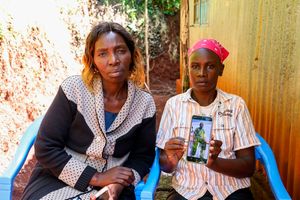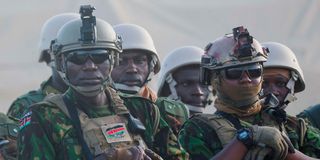
Members of the first contingent of Kenyan police stand in formation after arriving in the Caribbean country as part of a peacekeeping mission, in Port-au-Prince, Haiti June 26, 2024.
A year ago, the idea of Kenyan police officers standing guard in the gang-infested alleys of Port-au-Prince in Haiti seemed like a distant diplomatic fantasy.
Yet last week, far from Nairobi’s bustling traffic and familiar terrain, those same officers gathered at the Karibe Hotel and the LSA1 facility to mark a milestone few thought possible.
June 26 marked the first anniversary of the Kenyan-led and United Nations-backed Multinational Security Support (MSS) Mission deployed to help Haiti confront a spiralling security crisis driven by heavily armed gangs, a collapsing state and years of political turmoil.
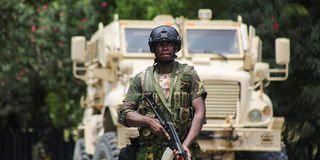
A Kenyan police officer walks in front of an armoured personnel carrier during a joint operation with Haitian police, in Port-au-Prince, Haiti July 29, 2024.
At the anniversary ceremony, MSS Force Commander Godfrey Otunge set the tone with candid reflection and cautious optimism.
“This celebration is not merely to mark the passage of time but to reflect on a year of dedicated service, resilient partnership and tangible progress,” Mr Otunge told assembled guests who included Haitian authorities, diplomats and international partners.
When the United Nations Security Council gave Kenya the green light to lead the MSS in October 2023, it was hailed as a bold step. For Kenya, it was a chance to demonstrate its emerging profile as a serious peace and security actor on the global stage.
From the outset, Kenya framed the mission as an act of solidarity with Haiti, a Caribbean nation with deep historical ties to Africa.

Kenyan police forces patrol a neighbourhood, a day before the arrival of US Secretary of State Antony Blinken who will visit the Caribbean country as Washington seeks to solidify the UN-backed security mission, in Port-au-Prince, Haiti September 4, 2024.
The then Inspector-General of Police Japhet Koome described the deployment as a “bridge of hope between Haiti’s troubled present and its aspirations for peace” during the send-off ceremony in Nairobi.
Within months of their arrival, Kenyan officers, many drawn from elite anti-riot and tactical units, began joint patrols with the Haitian National Police (HNP), pushing into gang-controlled neighbourhoods.
These operations enabled key roads to reopen and allowed humanitarian aid to reach communities that had been cut off by violence. In some areas, schools and health centres resumed operations under MSS protection.

Members of a Kenyan police force, part of a new security mission, stand at the airport after disembarking, in Port-au-Prince, Haiti June 25, 2024.
Commander Otunge hailed this as one of the mission’s early successes.
“The MSS stands as a beacon of hope and a symbol of the power of international cooperation,” he said, extending “sincere appreciation to countries that have supported the mission financially and through in-kind contributions,” singling out the United States, Canada, France, the Dominican Republic, and the United Kingdom.
The past year, however, has come with a human cost.
As the MSS pushed deeper into gang-held territory, Kenyan officers found themselves under fire in some of the Caribbean’s most dangerous streets.
Tragically, two Kenyan officers have paid the ultimate price while another remains missing.
On February 23, 2025, Police Constable Samuel Tompoi Kaetuai was fatally shot during an operation targeting a gang stronghold in Savien, Artibonite Province.
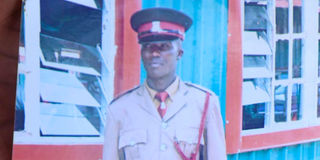
The late Samuel Kaetuai, the police officer who was killed in Haiti.
Despite efforts to stabilise him at Aspen Level 2 Hospital, Mr Kaetuai succumbed to his wounds, becoming the first Kenyan casualty of the mission.
A month later, on March 25, the MSS suffered another blow when Benedict Kabiru, a young officer attached to a rescue team, was ambushed by heavily armed gang members during a tense operation near Pont-Sondé.
Mr Kabiru has been missing since, and his whereabouts remain unknown despite ongoing search efforts by the MSS and Haitian National Police.
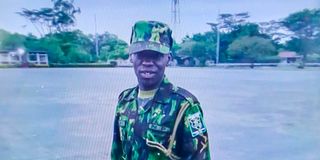
A picture of Benedict Kabiru Kuria, a police officer who went missing in Haiti.
The deaths and disappearances have weighed heavily on families back home, rekindling public debate in Kenya about the wisdom and risks of deploying police to a volatile, faraway conflict zone.
Despite the losses, the MSS has strived to distinguish itself from previous UN missions that left a bitter legacy among Haitians.
Unlike the controversial United Nations Stabilisation Mission in Haiti, which faced accusations of human rights abuses and a devastating cholera outbreak, the Kenyan-led MSS has emphasised accountability and community engagement.
Commander Otunge underscored the force’s human rights safeguards at the anniversary.
“In the past year, there have been no cases of sexual exploitation, abuse, or human rights violations by MSS personnel. This underscores our commitment to integrity and respect for the Haitian people,” he said.
Kenyan officers have made a deliberate effort to hold community meetings in gang-affected neighbourhoods, listening to local concerns.

